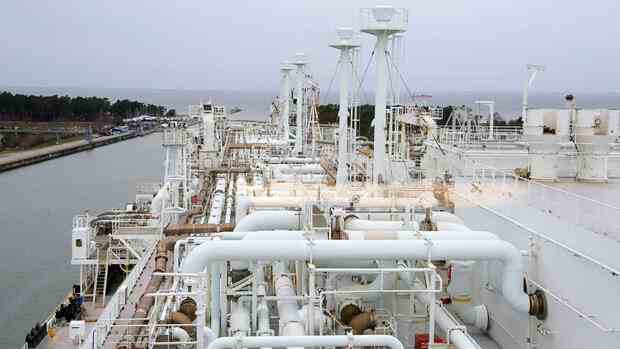In record time, the federal government had three floating landing sites for liquefied natural gas from countries such as the USA, Qatar and other countries built.
(Photo: IMAGO/Future Image)
Dusseldorf The importance of fossil fuels will decrease rapidly in the coming years. And renewable energies guarantee security of supply. These are the two surprising main statements of the annual BP Energy Outlook, which the British oil and gas company presented in London this Monday.
“The Ukraine war will have far-reaching consequences for the global energy system,” said BP chief economist Spencer Dale at the presentation of the report. While decarbonization and the energy transition have often been the focus in recent years, security of supply and affordability have now come to the fore. “The world needs to move away from oil and gas and towards energies that are produced locally in order to minimize energy risks and dependencies,” says the analyst.
For the first time, all three Energy Outlook scenarios predict a decline in fossil fuel use by 2050. By 2035 alone, BP expects global oil demand to fall between five and six percent, depending on the political environment. By 2050, the share of energy consumption could be minimized from around 80 percent at present to 20 to 50 percent.
The outbreak of war in Ukraine turned the energy world upside down. With Russia, one of the world’s most important oil and gas suppliers has failed within a very short time due to sanctions. For Europe and Germany, the country was by far the most important export partner for fossil fuels.
Top jobs of the day
Find the best jobs now and
be notified by email.
However, since the war began, global energy trade routes have changed dramatically, while the spike in global energy prices over the past year has prompted governments to accelerate domestic energy production.
>> Also read: This is how liquefied natural gas affects the climate
The federal government not only had three floating landing sites for liquefied natural gas from countries such as the USA, Qatar and other countries built in record time and ordered old coal-fired power plants back on the grid. Legislative simplifications for the construction of wind and solar systems were also introduced.
“The Ukraine war will have far-reaching consequences for the global energy system.”
(Photo: BP)
Share of renewables increases significantly
Nevertheless, the filling level of the national gas storage facilities has dominated the public discussion in recent months by a wide margin, compared to the far too slow expansion of renewables in this country. According to experts, what looks like a comeback for fossil energies will lead to the exact opposite in the next few decades: a rapid rise in renewables worldwide.
Because more and more countries want to increase their security of supply and reduce their dependency on other countries, domestic generation of energy is becoming more important, write the BP analysts. This mostly applies to wind, solar, geothermal, hydro and nuclear power. Depending on the scenario, the share of renewables could increase from almost ten percent today to between 35 and 65 percent worldwide by 2050.
Because countries want to increase their security of supply and reduce their dependency on other countries, domestic generation of energy is becoming more important.
(Photo: dpa)
One important point highlighted in the report is energy efficiency. According to the experts, energy consumption will decrease by 3.5 percent by 2035. This is also a consequence of the Ukraine war.
>> Read here: Will electricity be cheaper again for consumers in 2023?
Global economic growth is also clouding over as a result of the energy price crisis. Depending on the scenario, energy consumption could thus peak between 2025 and 2040, driven by efficiency efforts as a result of the energy price crisis. This is mainly due to the fact that electricity will become the dominant form of energy in the future and raw materials and recycling will become more efficient.
Germany itself saw the first signs of how important energy efficiency can be this winter. According to the Federal Network Agency, both industrial and household customers saved 17.6 percent of their gas consumption last year.
gas consumption
17.6
percent
According to the Federal Network Agency, both industrial and household customers saved their gas consumption last year.
The government had repeatedly pointed out that every individual had to save gas so that the country could get through the winter without Russian supplies – with success.
The last major energy crisis, the oil crisis in the 1970s, showed that economic growth can also be achieved without increasing energy consumption. At that time, it was possible to keep energy consumption more or less constant until 1990, while overall economic output rose by more than 80 percent in real terms.
More: Full storage facilities, few alternatives: Russia can hardly get rid of excess gas

